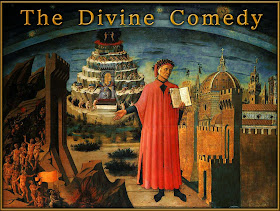You’re
standing in the poetry section of a Barnes & Noble bookstore. You don’t
usually read poetry, or fiction either, for that matter. But a book caught your
eye; you pull it from the shelf, open it and begin to read.
Without
realizing it, a random act of browsing in a bookstore leads to you changing
your life.
The
“you’ in question here was writer Rod Dreher, author of The Little Way of Ruthie Leming and Crunchy Cons and a writer for The American Conservative. The Barnes
& Noble was in Baton Rouge, Louisiana. And the book was Dante’s The Divine Comedy.
Dreher
describes what happened in How Dante Can Save Your Life: The Life-Changing
Wisdom of History’s Greatest Poem.
And
what a story it is.
What
a fascinating story it is. If you love poetry, and even if you don’t, this is a
remarkable book.
It’s
a story about how Dreher worked through serious physical illness brought on by
his family, himself, his and his family’s history, and the sense of place. He
tells it so well that the reader beings to see in Dante what Dreher found, and
more – the reader begins to recognize himself in the journey.
Of
all the things I expected from this book, that turned out to be the most
surprising, although in retrospect, it shouldn’t have been. That’s what good
writing does. And it says something about both Dante and Dreher, and Dreher’s
candor, openness and vulnerability in telling a story that is often painful.
With
Dreher and reader for the journey is Dante, himself guided by the Roman poet
Virgil.
Dreher
takes the scenes and lines that connected most with himself and the situation
he was trying, and largely failing, to deal with. Along with his Orthodox priest
and his therapist, he works his way through his own personal Inferno and Purgatorio. He doesn’t necessarily reach Paradiso (Dante does, however), but he does find healing.
How Dante Can Save Your Life is a much
larger story than one man’s journey. Dante is one of those writers not studied
much any more – a dead, white, European male. While he often criticizes the
church and the popes, he is very much in the Roman Catholic tradition. The
Divine Comedy is a profoundly religious book – and that alone might be
sufficient eliminate it from the curriculum.
 |
| Rod Dreher |
That
is criminal. It’s one of the great works of Western literature. It will still
be read and treasured long after the more contemporary and trendy stuff is
forgotten. What Dreher does in his book is to explain how meaningful and
important Dante is for many of the same things that bedeviled us in late
medieval and early Renaissance times that still bedevil us today. For that is
the genius of Dante and The Divine Comedy – the poet and his great work still
speak to the human condition.
The Divine Comedy has been
translated by numerous authors and writers over the years, including Dorothy
Sayers, Clive James, Henry Wadsworth Longfellow, and many others (and that’s
just a few of the English translations; there are many others in other
languages). Dreher prefers the translations by Robert and Jean
Hollander
and Mark Musa; the only
translation I’ve read myself is by John Ciardi.
Read
How Dante Can Save Your Life, and you
will read of how a great work literature helped guide one man on what was at
times a harrowing, life-threatening journey.
Painting: Dante Illuminating Florence
with His Poem, fresco by Domenico de Michelino; circa 1465.


Very interesting - I'm going to pin this for future reference. Thanks, great review.
ReplyDeleteGlen, I overlooked this when you first posted it. As a Christian and a poet, I felt that Dante's work was important to study. The thing is, I couldn't decide which translation is best! So, as I do with Bibles, I got several editions. Stumbling across your post today reminds me to revisit each of them. Thanks.
ReplyDelete